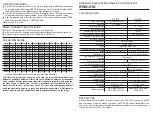
Page 10
4QD series controller instructions.
Pre-wired models
Some samples are supplied with multicore cables for
the controls to help the user with prototype machine
wiring. On these colour coding is:
6 core cable
Green
0v (battery –ve)
Blue
Pot wiper
Red
Pot +ve (max speed)
Black
Reverse
12v supply
White
inhibit
4 core cable
Yellow bve
Blue
’Ignition’ switch
Red
switched bve
Black
0v spare
Red and Black can be used for battery meter or relay
3 core cable
Red
bve (brake solenoid)
Blue
Brake solenoid, switched
Green
0v
The control wiring can all be thin: the control connectors supplied are designed to accept 7/0.2 wires and it is
suggested you use this.
Control wiring does not generally need to be screened, unless it passes close to motor or battery wiring.
There is a fuse in the control circuitry - see section 17.
11 Control wiring
Installed models
Colour
Function
connector
pin
Green
0v to pot
6 pin
‡ F
Blue
speed
6 pin
‡ E
Red
11.5v to pot
6 pin
‡ D
Black
reverse
6 pin
‡ C
White
+ignition
4 pin
‡ C
Yellow
bve
4 pin
‡ D
The diagram, left,
shows the pin
connections on the 6
way connector
commonly used
with our controllers.
See also section 11
for a picture of a
'Hand control box
and control lead
green
0v
blue
wiper
red
pot max
white
ignit'n
yellow
+24
reverse
black
locating ridge
View of soldered pins
Bulgin 6 pin
chassis mounting male
Motor polarity
As shown M+ is positive for forward direction. It is
usually easiest to connect the motor up without
regard for polarity and, if the direction is wrong,
reverse it later.
Motor wiring
Using several motors
Controllers cannot count! The controller will not be
able to tell if you are using one, two or fifty motors -
all it knows is the load it is being asked to bear,
which is determined by the mechanics (mass, speed
and gradient) not the number of motors.
The simplest way of using several motors is to wire
them in parallel to the motor terminals.
Connectors
Connectors are supplied with the controller. They are
'IDC's which stands for ‘Insulation Displacement
Connector’. The reason is that you do not need to
strip the insulation from the wire before using it - you
simply push the wires into the connector and squeeze
it closed in a vice or with a pair of parallel jawed
pliers. This is far quicker and more reliable, therefore
cheaper, than either screw terminals, crimps or
soldered connections.
You must however use the correct wire which is
flexible 7/0.2 (7 strands, each 0.2mm).
Nearest US equivalent: 24 AWG (commonly 7
strands of 32 AWG).
It is available in multicore, ribbon or as individual
wires. Wire which is too thin will not make contact.
Wire which is too thick will damage the tines. Single
conductor (telephone cable) wires will soon break


































